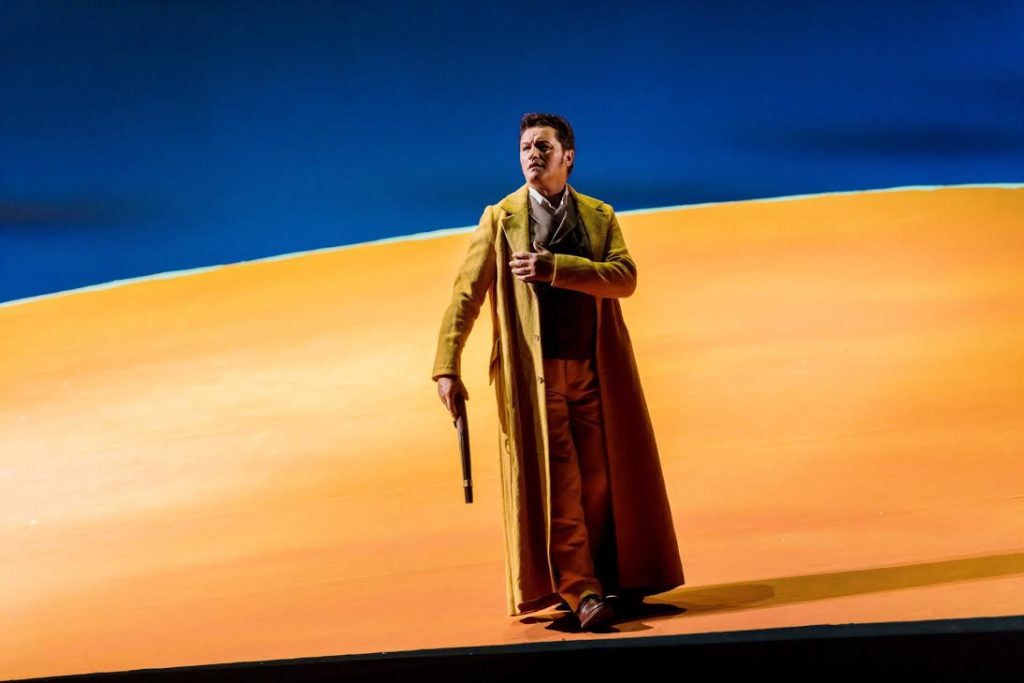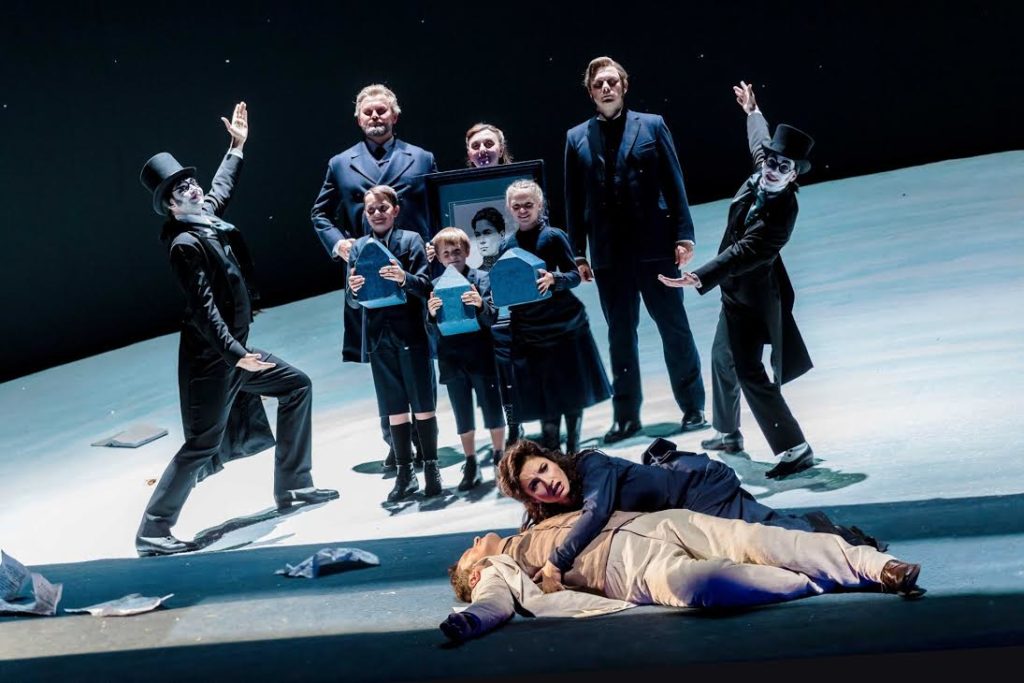
Polish National Opera 2020-21 Review: Werther
Piotr Beczała Reigns Supreme in Willy Decker’s Masterful Production
By Krzysztof Korwin-PiotrowskiAs I was going to the first performance of “Werther,” a drame lyrique by Jules Massenet, I was glad that I would finally listen to Piotr Beczała live in this role, which he has performed for 25 years.
Nevertheless, as I entered Teatr Wielki – the Polish National Opera, I was also a bit concerned that I was about to watch a production that had been touring Europe for a long time and whose current version was adopted from Narodni Divadlo in Prague. It quickly turned out that my worries were unsubstantiated. The Warsaw premiere was filled with freshness and incredible emotions.
When the curtain parted, I saw a world that coming out of the box. A raised floor is often used at the theatre, but here the whole structure was shifted to the left like a cubist construction with a lopsided ceiling that ominously hung over the characters. I felt as if the ceiling would soon fall on them, crushing them to the ground. Especially in Act four, the interior reminded me of a large sarcophagus, in which Charlotte and Werther would be locked forever, just like Romeo and Juliet.

Photos by: Krzysztof Bieliński, Grand Theatre and National Opera in Warsaw
Bring out the Best
Werther is undoubtedly one of the grandest operas of the 19th century, but not every orchestra can convey the beauty and drama of this music. Patrick Fournillier, who assumed the position of Director of The Polish National Opera after Grzegorz Nowak, has brought a lot of value. He led the orchestra with charm and precision, with French finesse and subtlety, and with dramatic tension and the richness of sound where necessary. He undisputedly brought out the best in the singers.
Piotr Beczała was an unquestionable hero from the beginning to the end of the performance. At times he sang with an unbelievable lightness and at dramatic moments with strong emotion as if his heart was about to burst. His transformation from a cheerful lover into a tragic hermit was wonderful. When he appeared on stage on a sunny day in July wearing a yellow suit and a brown waistcoat, he acted like a 20-year-old in love, singing the aria “O nature pleine de grâce” (O, Nature, full of grace) in a delicate manner while lying on the ground.
Soon thereafter, he takes Charlotte to the ball, full of positive emotion, yet the director made him hold a gun which he laid on the ground. “If in the first act you have hung a pistol on the wall, then in the following one it should be fired,” Anton Chekhov once wrote. And so it would come to pass, eventually.
Beczała exhibited more vocal finesse and elegance during “O, spectacle idéal d’amour et d’innocence” erupting into an intense passion on “Rêve! Extase!”
In the second Act, Beczała’s Werther transformed from an unhappy young lover to a jealous, enraged man. This was most visible during the moving duet with Charlotte as we saw gentleness mixed with anger and despair. This sense of desperation only built up in the ensuing acts.
The famous aria “Pourquoi me réveiller?” was sung phenomenally, even though Beczała was brutally interrupted halfway by an ovation from the audience, which disrupted the atmosphere for a moment and embarrassed the conductor. It was a pity. After the aria concluded, the audience clapped frantically and demanded “Encore!” I was disappointed that the music director did not allow it. Perhaps this time we would be able to listen to the aria from beginning to end… (Which was the case on Saturday, October 10). What was also impressive was that at times he sang this difficult aria on his knees or lying down and it still sounded effortless.
Beczała managed to prove yet again that he can be considered the best Werther in the world. He sang with flawless elocution and the precision of the French pronunciation which evidently isn’t easy.
Mezzo-soprano Irina Zhytynska’s interpretation of Charlotte lacked in vocal stability throughout. Her vibrato tended to be rather wobbly and she was often overpowered by the orchestra. One could argue that the wide vibrato was dramatically justified in the tearful “Va! Laisse couler mes larmes,” when she wishes she had married Werther, but it felt distracting in the first act’s “Il faut nous séparer” when Charlotte and Werther engage in a gentle exchange.
The final scene with Werther was also frustrating. Zythynska relied heavily on too many physical gestures to express her desperation, but it too seemed lacking in cohesion and sense of direction. As with her wobbly vibrato in the first Act, her constant movement distracted from her colleague’s more subtle approach in the death scene.
On the other hand, Stanisław Kuflyuk was outstanding as Albert. His interpretation portrayed a strong, powerful man fighting for his family and struggling to maintain harmony while getting rid of his rival. He was especially convincing when he delivered the aria “Ell m’aime” with finesse before nicely contrasting it with vocal potency in the ensuing act, his voice lush and glorious in its sound. Perhaps the only element of his performance that was lacking was his French pronunciation, which was overly imprecise.
Soprano Sylwia Olszyńska also delivered a solid performance as Sophie. She sang with a strong sound that emitted freshness and vibrancy.

Photos by: Krzysztof Bieliński, Grand Theatre and National Opera in Warsaw
Visual Masterwork
Willy Decker’s production was a visual feast full of symbols and details that allowed for deep immersion in the world of this story.
In Decker’s spectacle, the world is symbolically shown in three colors: blue, yellow, and white (a reference to Goethe’s novel where he presents the title character dressed in a blue frock coat and a yellow vest during the final scene) while the stage scenery and costumes, designed by Wolfgang Gussmann, are based on four colors (navy blue. yellow, black, and white). In Act one and two, the interior of the house is blue, with miniature town buildings and chairs. Behind a sliding wall of the house, there is infinite open space with a yellow floor, which reminds the audience of summertime. But there are more associations. Piotr Beczała, dressed in a sandy suit, lies on the yellow floor with one knee raised in the air. He seems relaxed and happy as if he was lying on a sunny beach.
But not all is sunny. Fate looms large throughout the production.
The first symbol of Fate is an image of Charlotte’s mother. Character constantly interact with it when it isn’t hanging ominously on the wall.
The second symbol of the Fate comes in the form of two servants. They are strange creatures, one tall (Jasin Rammal-Rykala) and the other short (Jacek Ornafa). In the beginning, they look like characters from the circus and behave in an exaggerated manner, like in silent films. Both wear black tail-coats and top hats. They reminded me of the Janicki brothers from Tadeusz Kantor’s Theatre of Death, but Europeans may associate them with Vladimir and Estragon from “Waiting for Godot” by Samuel Beckett. At some point, Estragon says: “What about hanging ourselves?” But here they are the embodiment of ominous Fate, which leads Werther to his tragic end. A striking moment is when they take his revolver and then, at the end of Act 3, give it to Werther to finally put an end to this story.
Also worthy of note in Decker’s version is the simplicity of its visual approach, allowing for a clearer exploration of the characters’ inner life. The stage design draws on cubism, whereas simple and minimalistic models of buildings inside the house look like cardboard toys. But when Werther grabs such a building, what becomes even more striking is the enormous sadness caused by the fact that he no longer has a home. He feels unhappy everywhere because he associates home with the image of Charlotte and her younger siblings. There is a beautiful moment when Charlotte and the children pose as if for a souvenir photo, a snapshot Werther tries to cling to.
Another special moment comes in the first scene of Act three, when Charlotte and Albert are seated at a table almost as long as the stage, facing each other from opposite ends. The table stays there after the wedding reception in Act two. Charlotte lies one hand on the top of the table and in her left hand she is holding huge yellow pieces of paper with Werther’s letters. When she scatters these letters on the floor in the next scene, it shows her great suffering and endless torment. As she finally addresses God and tears up the letters, it symbolizes her attempt to put an end to her love, but when Werther appears, the feeling suddenly comes back with overwhelming strength.
Overall, this was a fantastic performance featuring not only a heroic turn from Piotr Beczała but a production by Decker filled with a mesmerizing visual style.


